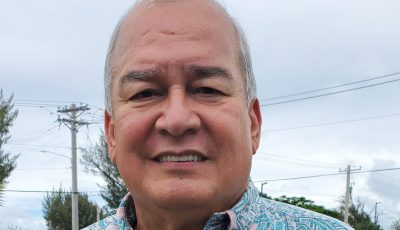3 possible solutions to NMI’s ‘troubled economy’
Blanco says businessman is absolutely right
Tinian businessman and Board of Education member Phillip Thomas Mendiola-Long is offering three potential solutions for the CNMI’s economy, which he describes as “in deep trouble.”
In a Facebook post yesterday, Mendiola-Long said it doesn’t seem like anyone in leadership is proposing any solutions to save the CNMI at this point and that being creative when pursuing solutions is necessary.
“We must get creative,” he said. “Our island economy has been tethered, like an addict is to drugs, to the easy importation of just about every consumable item we use on a daily basis.”
Mendiola-Long hopes to catch the attention of the CNMI Legislature and the administration with his post and inspire them to pursue his suggestions.
For one, Mendiola-Long recommended that the CNMI Legislature amend the state banking law to require all banks in the CNMI to allocate a minimum percentage of their capital investment resources for “local” agriculture production loans.
He also pushed for the Legislature to review the excise tax law and regulations and increase the importation taxes on “local” industries that are created by this capital investment program.
Finally, Mendiola-Long recommended that the CNMI government should exempt all agriculture businesses from the Business Gross Revenue Tax for five years so that the agriculture industry can become mature, prior to the government taxing it.
Asked for comments about Mendiola-Long’s post, House Ways and Means Committee chair Ivan Blanco said he read it yesterday morning and that the businessman “is absolutely right.”
Blanco said Mendiola-Long’s idea of redirecting the bank’s Community Reinvestment Act requirements to support the local farming industry is on point.
“We can only succeed by partnering with other stakeholders in the community. I thank Mr. Phillip Mendiola-Long for sharing his business insights,” the lawmaker said.
With respect to his first recommendation, Mendiola-Long said these state-required private banking loans, coupled with a newly created Commonwealth Development Authority Agriculture Loan Program would provide capital for agriculture entrepreneurs to open egg farms for locally produced eggs, piggery, chicken, and beef production farms, vegetable farms, bottled water producers, dairy producers, etc.
Regarding his second recommendation, Mendiola-Long cited that the CNMI government should tax imported eggs from the U.S. at a rate that would give locally produced eggs a favorable advantage. “This would enable new companies, who produce and employ locally, to compete on a fair playing field and be protected by a government that finally understands that locally produced products keep our economy going, as opposed to the importation of products, which send our economic dollars and jobs off island,” he said.
The businessman said his recommendations will not only help the CNMI’s economy by creating local jobs and circulating economic dollars within the CNMI” economy, but it would also provide food security for the islands.
“We would not be dependent on the Matson ships to let us know if our islands will starve or not. We would control our own future by producing locally and not being dependent upon food being delivered to us,” he said.
He pointed out that, prior to World War II, the CNMI was such a massive producer of agriculture that all three islands had locomotive train systems and tracks throughout the islands to transport all the produced agriculture.
About 40 years ago, he said, Tinian had a functioning dairy farm that packaged its own produced pasteurized milk up until the 1980’s.
“What happened? Why did it all disappear?,” Mendiola-Long asked.
The simple answer, he said, is that the CNMI ignorantly allowed low-cost importation of the same exact product that the Commonwealth produced locally.
The businessman said the CNMI allowed the importation of U.S. and Australian milk to undercut Tinian’s milk and essentially put the island’s only agriculture manufacturing facility (which employed locals) out of business.
“Think bottled water, eggs, vegetables, beef, chicken, pork. …We import all of them, essentially displacing our local ability to produce them locally,” he said.
Mendiola-Long said the CNMI can still do this.
“We are all farmers. Iif the government provides a pathway, some of us will choose that path and become great agriculture entrepreneurs,” he added.



























